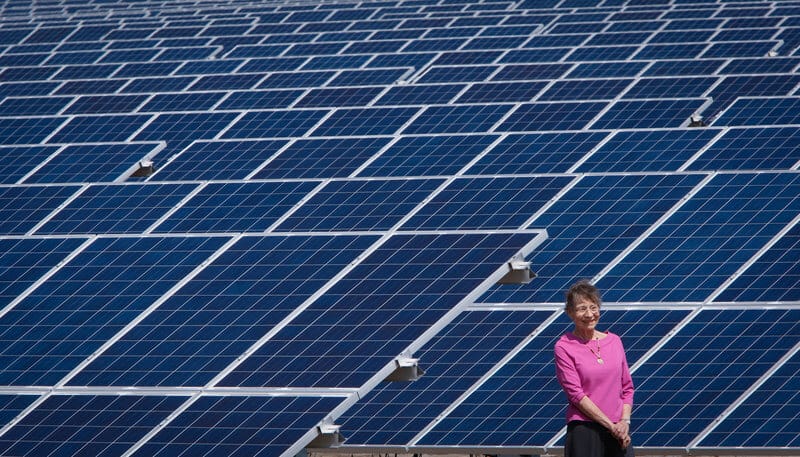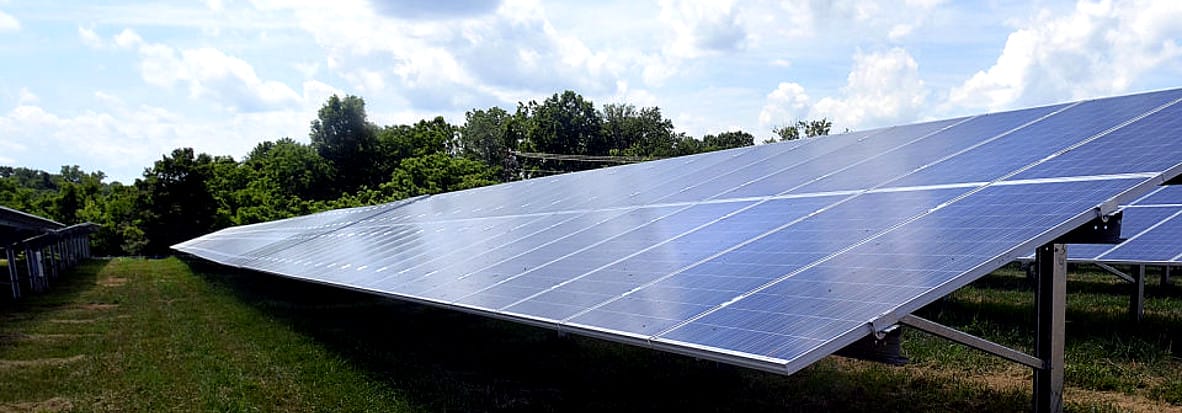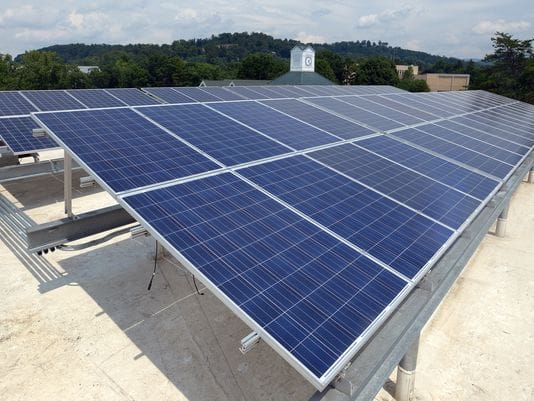Solar farms taking root in North Carolina
FAIRMONT — Helen Livingston's family has owned a 300-acre farm near Maxton for generations. Now 45 acres of the land is covered with more than 26,000 dark solar panels, making it part of a growing movement to harvest electricity from the sun.
Solar farms like Livingston's are cropping up all over North Carolina, shining rays of hope on economically depressed areas by bringing jobs, a constant stream of revenue and the potential to attract eco-friendly industry and economic investment.
North Carolina has become a leader in the country in the growth of the farms, and Robeson County is near the top of the state in terms of solar capacity.
Chris Dunbar, vice president of operations for Asheville-based FLS Energy, calls North Carolina the “East Coast hub” for solar energy. FLS is one of the companies with several solar projects across North Carolina.
“If you want to talk to people who know about solar, you come to North Carolina,” Dunbar said.
Solar farms convert sunlight into electricity. Their panels capture the sun's rays as direct current energy, before inverters turn it into alternating current power that is fed into the power grid. The power is used in homes, businesses and utilities.
North Carolina now has more than 120 solar farms, according to the N.C. Sustainable Energy Association, putting it at the top of several reports on solar capacity and the construction of solar farms.
Last year, North Carolina added more solar capacity than all but two other states, according to the Solar Energy Industries Association. In the first three months of this year, the state moved up to second in the country, according to a May report by SNL Energy, an online publication that covers energy issues.
The state was fourth last year in installed solar capacity with enough to power 64,500 homes, the association said.
The creation of the farms translates into millions of dollars invested in North Carolina, according to the Solar Energy Industries Association. In 2013, about $787 million poured into North Carolina, an increase of 156 percent over the previous year, with more growth expected this year.
The growth is led by three companies with solar projects dotting the state at a rapid rate. Together, they account for more than 20 farms in the Cape Fear region.
Robeson County has become one of the focal points for the state's growth. It ranks second in the state for capacity behind Catawba County and has the fifth highest number of farms in the state, according to the N.C. Sustainable Energy Association.
With eight farms completed, it has more farms than any other county in eastern North Carolina, according to the association.
Dunbar said available property makes Robeson County a great place for solar farms.
“I think it starts with cheap land,” he said.
The growth isn't slowing down, despite some resistance from some residents who don't want farms in their neighborhoods.
“Overall, they've been well received,” said Robeson County Manager Ricky Harris. “It's a positive venture.”
A local investment
Solar farms are growing in North Carolina as a result of the decreasing cost of generating the power; tax incentives that make it easier to turn a profit; and state polices that set contract prices for the electricity.
Some supporters fear those advantages could be diminished in the future. The N.C. Utilities Commission is considering a request to change the contract policy. Some tax incentives are scheduled to sunset in 2016.
Joel Olsen, president of Cornelius-based O2 Energies, said the Utilities Commission will make decisions based on suggestions from power companies that would change existing rules of how renewable energies facilities sell power. One suggestion would reduce the size of a solar generating facility that would qualify for a set contract price.
“This drastic change that the utilities want would stifle competition in the regulated monopoly power market, and makes little sense in light of the growing numbers of jobs created by the renewable energy industry in our state,” he said. “Commissioners should reject it.”
A decision could come by this fall.
Olsen said incentives for solar power pay off. His company has seven operating solar farms, three under construction and six in the development stage, he said. Three are in the Cape Fear region, including one near Fairmont that's being built with FLS Energy.
Every dollar in tax credits returns $1.92 in state and local tax revenue, he said.
Robeson County Manager Ricky Harris said the property values increase when solar farms are built.
“The solar farms do create a revenue stream for the county,” he said.
The farms have other benefits, too, Olsen said. For example, a 20-acre solar farm next to Fairmont High School provides power to the town's downtown and other homes and businesses in the area, Olsen said.
On a cloudy Wednesday, the farm was operating at about 50 percent capacity. In the rain, the facility still works at about 20 percent, Olsen said.
“This is local energy,” he said. “It was built here, and it's generating here.”
In addition to generating local jobs, some components of solar panels are built in the area, Olsen said. Pilkington, a glass manufacturer in Laurinburg, makes the fronts of the panels, while Dupont in Fayetteville makes the back sheets. Horne Brothers Construction in Fayetteville does grading and other work on solar farm sites, he said.
Olsen said energy companies hire local workers to build the farms.
“One of the good things about solar is it's not only distributed energy, it's distributed opportunity,” he said.
A 30-acre farm under construction in Fairmont hired about 15 people who live within a mile and a half of the facility, said David Fowler, the site superintendent.
“There's been very little turnover,” he said. “These guys have just been outstanding.”
Blair Schooff is vice president for sales and marketing of Strata Solar, which is leasing the land owned by Livingston and her brother. The Chapel Hill-based company has about 60 solar farms, including 19 in the Cape Fear region. They expect to have about 20 more farms operating by the end of the year, he said.
Schooff said Strata tries to cluster their farms close to each other so work crews can have steady work near their homes.
Paul Hinkson, a superintendent overseeing work at a Strata Solar farm in Erwin, said about 50 of the 60 people working on the site were hired locally.
“A lot of these guys were on my last crew in Newton Grove,” he said.
A tool for the future
In some cases, the benefits of building solar farms aren't immediately apparent. For many counties struggling to recruit new industry, solar farms have become a tool to drive economic development. Olsen and others said building solar farms can attract companies that want to get energy from renewable resources.
Google, QVC and Apple have operations in North Carolina that rely heavily on solar power.
Ashley Cagle, executive director of the Montgomery County Economic Development Corporation, said solar farms are planned near an industrial megapark in both Moore and Montgomery counties. The 3,000-acre park is designed to attract environmentally friendly companies.
“We feel like we're getting into the game,” Cagle said. “It definitely fits into our goal for the park.”
Fairmont Mayor Charles Townsend said some manufacturers look for clean energy because “they want to be associated with solar energy.”
Townsend said the solar farms are positive for the town, which has about 2,700 people. The new farm will be the third built near the town in the last three years.
“We're moving toward the future,” he said.
Dixon Ivey Jr., Robeson County's county's zoning administrator, said another farm has been approved for construction in Robeson County, and six others are proposed. If all seven are built, the county would have the second highest number of farms and could have the largest capacity.
Kenneth Rust, who owns the McDonald's in Fairmont, said he is happy to have a solar farm providing energy for the restaurant.
“This is one of my personal passions,” he said.
Rust, who owns seven McDonald's in Robeson and Scotland counties with his wife, Lisa, said the area has suffered economically.
“I'm just excited for economic development in Fairmont,” he said. “It's nice to see a bright spot.”
On Wednesday, Townsend, Rust and other Robeson County officials toured the farm next to the high school and another one under construction on Turkey Branch Road with executives from O2 Energies. The elected officials said they were impressed with the farms.
Livingston said she and her family had not considered leasing their property for anything but traditional farming until a Strata representative approached them in 2011. The solar farm was a good option because the family has traditionally been environmentally conscious, she said.
“This kind of came out of the blue for us, but we were absolutely thrilled,” she said.
Livingston said she is happy that the solar movement is spreading across the state.
“North Carolina is being referred to as the second sunshine state,” she said.
Facing opposition
Solar farms have been generally well received, but a few have faced resistance.
In Moore County, the Planning Board denied changes to zoning laws that would allow a solar farm, focusing on government subsidies to the solar industry and whether the county would have to pay to clean up solar farms that closed. County commissioners, which had final say on the matter, later voted to approve the changes and allow solar farms in the county. A solar farm in the county near Eagle Springs is nearing completion.
One planned solar farm in Rowland last year generated some controversy but was settled, Harris said. Residents were concerned about how close the farms were located to homes, their possible effect on property values and potential health risks.
Betsy McCorkle, director of government affairs for the N.C. Sustainable Energy Association, said education is important when a solar farm is proposed for an area.
“The more people learn about solar farms, the more they like them,” she said. “Sometimes uncertainty about a project can bring negative feelings, but once members of the community realize that these farms are very quiet, odorless, and have a significant positive impact on the county's tax base, they are usually asking how soon another one can be brought online.”
Livingston said she thinks some people have misinformation about solar energy.
“How can people be all excited about fracking and landfills, but scared of solar,” she said, referring to a method of horizontal drilling for natural gas that uses chemicals and sand to fracture rock. The General Assembly has cleared the way for fracking.
Livingston said a solar farm near her home in Laurinburg faced opposition last year. The City Council voted against the farm, but the move was overturned in court, she said.
“The arguments against solar just don't hold water,” she said.
Connie Oxendine, who lives next to the solar farm operating in Fairmont, said she doesn't mind the farm itself, but she isn't happy that sheep graze on the property.
“Sometimes it smells,” she said.
Olsen said O2 Energies lets sheep graze on all their farms, and donkeys protect the sheep. When the grass gets low in Fairmont, the animals are moved to a nearby solar farm in Maxton.
But Oxendine said her family was told they couldn't have livestock when they bought their property 14 years ago.
“It just irritated me, made me mad, when I found out they were going to put livestock out there,” she said.
When Olsen was told of Oxendine's complaint, he said the company wants to work with the neighbors.
“With that feedback, we can adjust,” he said.
Looking to the future
James Hunt, who lives in the third house from the Fairmont solar farm, said he has no complaints about it. He said Fairmont and the area benefits from the solar farm.
“It's helpful to not have to burn coal or natural gas to produce power,” he said.
Supporters say the future can be bright for solar in North Carolina.
State universities are providing research for the industry.
The University of North Carolina at Chapel Hill's Energy Frontier Research Center for Solar Fuels recently received $10.8 million from the U.S. Department of Energy's Office of Basic Energy Sciences. The center will use the money to study how to make solar energy technology better so devices can produce fuel more efficiently.
N.C. State University's N.C. Clean Energy Technology Center, formerly called the N.C. Solar Center, helps develop technology and policy initiatives in solar and other clean energies for businesses, policymakers and other organizations.
McCorkle said the solar industry needs a policy signal from state officials that North Carolina still wants to be a leader in solar.
“The solar industry is working under constant uncertainty, which stalls new investments. Policymakers should be doing everything they can to signal that this is an industry we want in North Carolina,” she said.
Olsen said the cost of solar energy is going down while most other forms of producing power are increasing.
“The future of the industry depends on legislative and regulatory certainty,” he said. “North Carolina has been lucky to have that, and we hope that it will continue.”
via Solar farms taking root in North Carolina – Local News – Fayetteville Observer.


